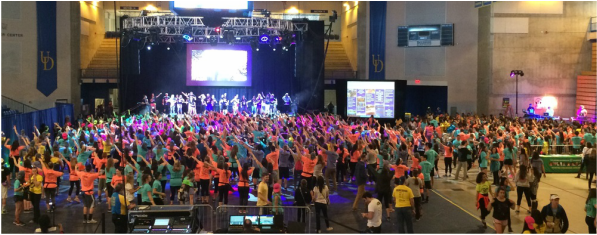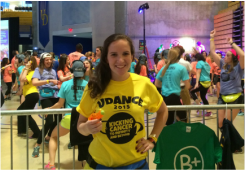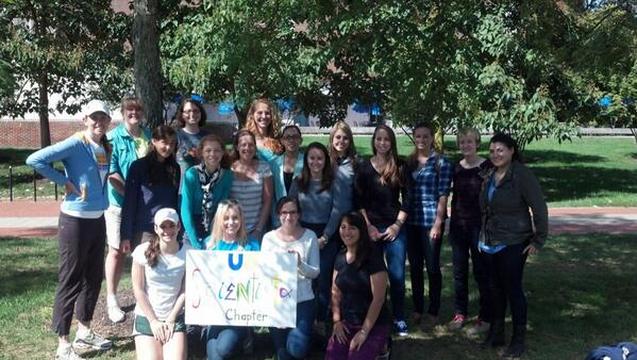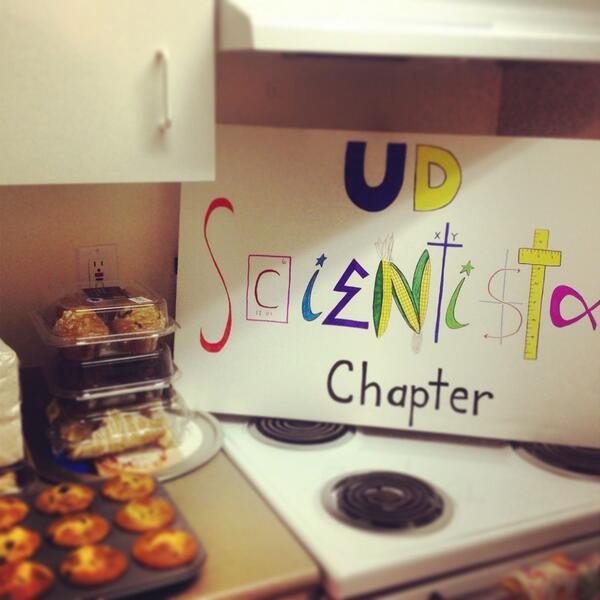|
3/23/2015 0 Comments UDel Scientista at UDance Since our chapter was charity challenged, we decided to take part in raising money for our university's 12-hour philanthropic dance marathon UDance. UDance partners with the B+ Foundation to help fight childhood cancer. Our team goal was to raise $200 which we gladly surpassed by raising $230! It is amazing that we had this opportunity to contribute to the UDance total of over $1.28 million dollars!
0 Comments
9/25/2014 0 Comments Link Dump!Here are some cool, science and lady-friendly links to check out while you're working up the motivation to start your latest projects!
1) Last Week Tonight with John Oliver: Miss America Monologue Not only is this clip ridiculously funny, but it gives a huge shoutout to Society for Women Engineers. I encourage you to share this, as it's generated lots of donations and social media following for SWE Watch it here! 2) New York Times--Microscopic Issue of Unknown Consequences Really interesting article about a side of climate change I haven't seen much coverage of! This is certainly timely in light of all the recent 300k+ person march in NYC and all the discussions about human contribution to CO2 emissions. Check it out! 3) Huffington Post--Are Nasty Comments like This Keeping Women Out of Science? Stories from women about casual (and not so casual) sexism during their scientific careers. Read about their experiences 4) New York Times--Exposing Hidden Bias at Google A discussion about the lack of women in top tech firms including Google. Google has now started a lecture series for its employees by Dr. Brian Welle that discusses the natures of Implict Bias. You can actually watch these! "The effect of bias is powerful, and it isn’t softened by Silicon Valley’s supposedly meritocratic culture. In the lecture, Dr. Welle shows a computer simulation of how a systematic 1 percent bias against women in performance evaluation scores can trickle up through the ranks, leading to a severe underrepresentation of women in management." Learn about and watch the lectures here! 5) BBC News--Shellshock: 'Deadly serious' new virus found A vulnerability in Linux/Unix could be a really big problem, to say the least. Find out more! Keep on doing the science! Most of your lovely e-board is slogging through our theses, and I'm sure midterms are starting up soon. Best of luck to everyone. until next time, Kelly 9/3/2014 0 Comments Academic PressuresMost people in college (probably all, but I'm low-balling it) face significant academic pressures that can negatively impact health. One of the most stressful lectures I had in my intro to neuroscience class was the one on the effects of stress on the brain and body! Sometimes, chronic stress and low self-esteem combined with the life changes associated with college can result in mood disorders. Many studies have examined mood disorders and stress in young adults (especially those in a university setting). Additionally, the University of Pennsylvania, which is a mere 30 minutes from UD, has been experiencing a large amount of suicides in the past year, which seem to have some link to academic and other university-related pressures.
Since mood orders and perceived stress during college have a large impact on women, I thought it might be helpful to share some of this. http://muse.jhu.edu/journals/journal_of_college_student_development/v049/49.5.dixon.html This is a study done by Dixon and Kerpius at Arizona State University in 2005, which examined links between depression, self-esteem, and mattering (as in, "do you matter?"). http://www.phillymag.com/articles/penn-suicides-madison-holleran/ This is a well-written article about the suicides at Penn that asks some thoughtful questions about stress and how young adults cope with transitioning from high school to college. It's written by Steve Volk at Philly Magazine. I will continue looking in the meantime into what other schools' suicide-prevention task forces have found to be helpful and unhelpful about schools' resources. If you are experiencing suicidal ideation, please talk to someone. Mobile Delaware's number is 1-800-652-2929, and UD's Counseling Center is available at 302-831-2141. You are worth it. As we start to adjust to our fall classes, this is a great time to reminisce about the conclusion of last semester. In the weeks prior to final exams, the UD Scientistas were hard at work putting together a panel discussion for our campus!
On May 12th, the UD Scientista chapter hosted a discussion panel titled "Talk Nerdy to Me: Careers in STEM and How They Evolve." We invited 5 successful and inspiring women to answer questions submitted by Scientistas. A UD alumna, Sujata Bhatia, traveled all the way from Cambridge, Massachusetts to join us for our panel! Here is a little background information on our guests: Dr. Sujata Bhatia is the Assistant Director of Undergraduate Studies in Biomedical Engineering at Harvard, where she lectures in Biochemical Engineering and serves as an associate at the Kennedy School of Government, an assistant dean at Harvard's Summer School, and an administrative fellow at the Office of the Assistant to the President at Harvard University. Sujata earned B.S. degrees in Biology, Biochemical, and Chemical Engineering from the University of Delaware. She proceeded to earn a PhD and MD from the University of Pennsylvania and served as a principal investigator at DuPont. She joined the biochemical engineering faculty at Harvard in 2011 and was voted by the class of 2014 as a Harvard Yearbook Favorite Professor. Dr. Catherine Grimes, assistant professor of Chemistry and Biochemistry at the University of Delaware, earned a B.S. in Chemistry from Villanova, an M.S. from Princeton University, and a PhD in Chemistry from Harvard University in 2006. Additionally, she completed a Postdoctoral Internship at the Cancer Research Institute at Harvard University and the Massachusetts General Hospital from 2006-11. Her lab currently investigates innate immune system activation by bacterial threats. Dr. Kristi Kiick is the Deputy Dean of Engineering at the University of Delaware. She earned a B.S. and M.Sc. in Chemistry from the University of Delaware and the University of Georgia, respectively, and M.Sc. and PhD in Polymer Science in Engineering from the University of Massachusetts, Amherst. She has also worked as a research scientist at Kimberly Clark Corporation (1992-6) and the analytical development chemist at the Martin Marietta Energy Systems (1991-2). She is currently a professor in biomedical engineering at the University of Delaware and is also affiliated with the Delaware Rehabilitation Institute and the Delaware Biotechnology Institute. She has served as an invited speaker at Davidson College, University of Minnesota, and Reading University (UK). Dr. Hagit Shatkay-Reshef, associate professor Computer and Information Sciences at the University of Delaware, earned a B.Sc. and M.Sc. at The Hebrew University of Jerusalem, Israel and a PhD in Computer Science from Brown University (1999). Her postdoctoral fellowship was at the Computational Biology branch of the NCBI. She coauthored the book, Mining the Biomedical Literature (Computational Molecular Biology) with Dr. Mark Craven in 2012. Dr. Marianna Safronova, Professor in the Physics and Astronomy Department at the University of Delaware, earned a B.S. and M.S. at the Moscow State University department of Physics, Quantum statistics, and Field theory subfield, and a PhD in the department of Physics at Notre Dame University in 2001. She was the American Physical Society's Woman Physicist of the Month in August 2012 and has served on the NSF Atomic Theory panel three times. Our only hope is to continue what we have started, and plan more events that can help our Scientistas and other STEM majors on campus! Nicole Place Co-Director & Web Advisor UD '16 10/30/2013 0 Comments Improving Science EducationLast month, the New York Times published an article on their website giving ideas from a variety of people--from experts to beginning students--about how to improve science education in the US. As a student and budding scientist, I've definitely encountered a lot of the issues discussed in this article firsthand, and think that curriculum issues probably contribute to the low retention rate in STEM fields.
A recurring theme in the Times article is that the typical format of introductory STEM classes fails to engage students at all stages of their education. They are focused mainly upon the history of their fields, which are important, but uninteresting. This begs the question--is it important for students to learn all of the dates and names at the expense of them continuing in their fields? One of the contributors, Freeman A. Hrabowski III (president of the University of Maryland), discusses how this approach can affect students' perceived aptitude in STEM-related pursuits at an early stage of their education: 'When I give talks around the country, I often ask the audience: "How many of you knew you were an English/history type or a math/science type by the time you were in 11th grade?" Almost all the hands go up. And, when I ask why, I often hear, "Because I was better in English." The question is: How does someone know that at 15 or 16? The way that math or science works in our lives is not always obvious.' The sad part about the lack of interaction between students and the material they're learning is that young students get the impression early on that lack of success or interest in the historical aspects covered in introductory courses indicates that they are simply not cut out for a career in STEM. I know I'm not the only person who came out of Intro Chem I afraid that I was simply not cut out for my major. Luckily, I talked to upperclassmen, who assured me that despite the material being harder, higher levels of STEM are more interesting and interactive, which can actually make them less difficult than the packed 100-level lectures. Without this kind of support (which students may or may not have found during freshman year), it's easy to see how students become disenchanted with the idea of becoming scientists. While collegiate introductory courses contribute to students dropping out of STEM fields, it is earlier educational experiences that dissuade them from pursuing a BS degree in the first place. This is especially important for us as female scientists to consider, as there is a marked difference in interest and perceived ability between the sexes beginning as early as middle school. Check out pages 21-23 of this incredibly informative analysis about the lack of women in STEM fields. It is currently thought that a combination of social pressures and biases as well as lack of engagement with the material are some of the biggest contributors to the gender gap in BS degrees and the professional STEM environment. Girls and women tend to perceive themselves as being not as gifted in mathematics, even when they score high in achievement tests. Those with high math scores are still much more unlikely to pursue math-related fields than high-scoring male peers. It seems like perception math and science ability is formed even earlier than high school, and can translate to a lack of interest in these fields. When I was in high school, I was definitely one of those high-achieving, yet "uninterested" girls. I always saw myself as being unable to do well in science, and simply stopped caring. Luckily, for me, biology very suddenly made sense to me after learning about neurons in AP Psychology. It was the first spark of interest I'd ever had in science, and it happened halfway through my senior year. I can tell you from personal experience that it is difficult to being learning basic biology and chemistry for the first time as one speck in an enormous lecture hall. Many of my peers had taken many relevant background courses in high school, if not AP courses. I came in knowing only Hund's Rule and the names of the stages of mitosis. I struggled through many of the introductory courses despite many hours of studying, not due to a lack of aptitude, but due to a lack of past experience and knowledge. This experience has made me even more convinced that the homogeneous nature of STEM fields is simply because of a lack of early science and math education--no one likes spending time and effort on uninteresting material while still doing poorly in it. Those who are likely to have this experience are students who, like me, lacked prior science education and who also may have been socialized to perceive themselves low in ability. Women, racial and ethnic minorities, and those of low socioeconomic status typically fall into one or both of these categories. It only makes sense, then, that all are underrepresented in some or all STEM fields. Engaging students in college and high school (and earlier!) seems like the best plan to increase the number of BS degree-earners, particularly the numbers of women. For me, the interest came with the study of how neurons in the brain ultimately influence behavior. What is it for you? What kind of educational experiences contributed (or hurt) your STEM ambitions? I'd love to hear from Scientistas about how the issues mentioned in the articles were present (or not) in your lives. ---Kelly 10/28/2013 0 Comments What Are We Planning?Tutoring Opportunities:
Since Christiana High School has lost a huge amount of funding for their STEM programs, the UD Chapter of Scientista is excited to start working with them! Regular tutoring sessions will be taking place, approximately, from 2 to 4pm on Wednesdays and Thursdays. Weekly demonstrations will also take place to inspire the students of with the fun facets of science. We are also hoping to provide, by fundraising, field trip opportunities. Flyer Campaign: Soon we will have flyers to distribute across campus to help promote Scientista, here at the University of Delaware! Fundraisers: To fund our tutoring initiative and to sponsor speakers to come to UD, we are brainstorming fundraiser ideas that will attract interest from everyone on campus! As of Friday, October 25th, Scientista at UD is officially an RSO! Now it is possible to sponsor speakers, receive funding, and reserve rooms! 9/16/2013 0 Comments First UDel Scientista Meeting! |
UDEL SCIENTISTAThe University of Delaware Scientista chapter is dedicated to providing every UDel scientista with campus-related advice, news, articles, features and more. Browse through our website and join our mailing list to gain access to great resources and events! PHOTOSWHAT'S NEWUPCOMING EVENTSARCHIVES
March 2015
CATEGORIES |
The Scientista Foundation, Inc. All Rights Reserved © 2011-2021 | Based in NY | [email protected]
The Network for Pre-Professional Women in Science and Engineering
The Scientista Foundation is a registered 501(c)(3) -- Donate!
The Network for Pre-Professional Women in Science and Engineering
The Scientista Foundation is a registered 501(c)(3) -- Donate!





 RSS Feed
RSS Feed